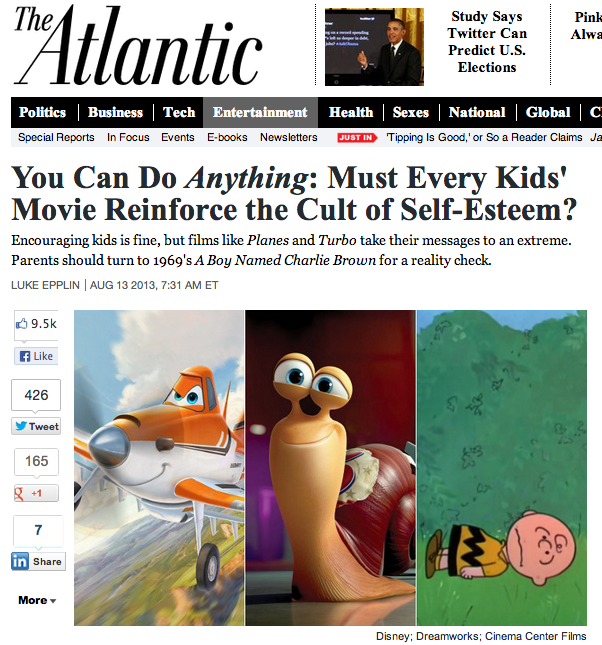Sorry Kids, You CAN'T Do Anything
I was sobbing as I read George Saunders' convocation speech about regret and kindness and the passage of time. I was fist-pumping, grinning, and yelling "I KNOW!" as I read this piece by Luke Epplin in The Atlantic on kids' movies and the "cult of self-esteem".
Steven and I have spent many-an-hour discussing how kids' movies all feel the same now and the wonders/evils of being pumped with outrageous self-esteem from a young age. This article does that thing that good writing does: concisely and convincingly puts your scattered thoughts into words, then takes it one level higher.
I'm not even going to BOTHER explaining the plots of "Planes" and "Turbo" to contextualize these quotes, that's how depressingly obvious they are. Instead I'll cut straight to some of those moments from the article that made me go, "YEAH!":
Right? I mean, I'm not saying we've all got to pick up some Little Red Books and throw away any personal ambition for the sake of the commune; but there's something to be said for learning how to rationally assess your own skills and cooperate with others to succeed at something larger than you could accomplish alone. AND:
Life doesn't happen like that kids! It takes hard work to get good at something. And hard work is TEDIOUS, even when it's for something you enjoy. (Ahem WRITING. Or ANYTHING really.) To pretend otherwise is to set yourself up for that thing that anyone who grew up watching movies like this isn't particularly prepared to face: failure.
Last year when Anne-Marie Slaughter's much talked about article "Why Women Still Can't Have It All" came out, I wrote about how rock climbing came to embody the general betrayal I felt in my early 20s of having been told all my life I could do anything if I just put my mind to it. I still stand by that. Which isn't to say that I wish I'd never received any positive encouragement-- far from it! That's the only way I survive! (All those people who are like, "The more Coach yelled in my face and told me I couldn't do it, the more I wanted to show him"? NOT MY PEOPLE.) But again, it's a real shame that so many kids' movies out there are promoting this cocktail of instant gratification and mass uniqueness (a paradox I know!).
The rest of the article looks at how "A Boy Named Charlie Brown" (1969) is pretty much the opposite of every movie out there right now in its relentless themes of failure and non-exceptionalism. It all makes me want to high-five Charlie, Linus, and Lucy-- Linus especially when he tells Charlie:
So go read this article, then please, go make a kids' movie that we can all actually learn something valuable from. It's an "out-believing" wasteland out there right now.
